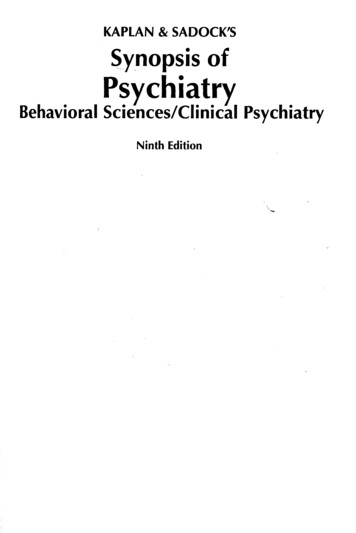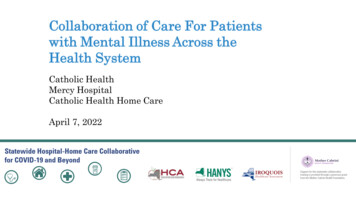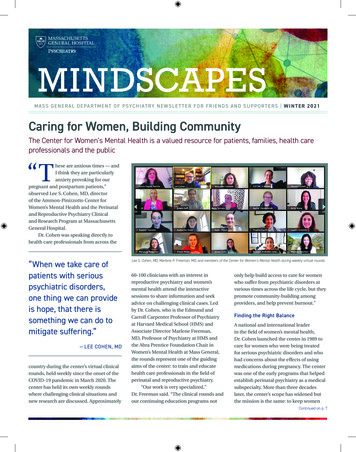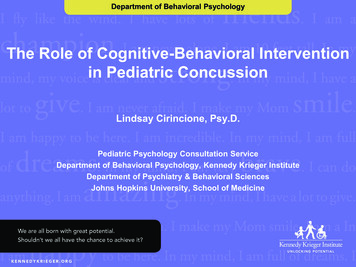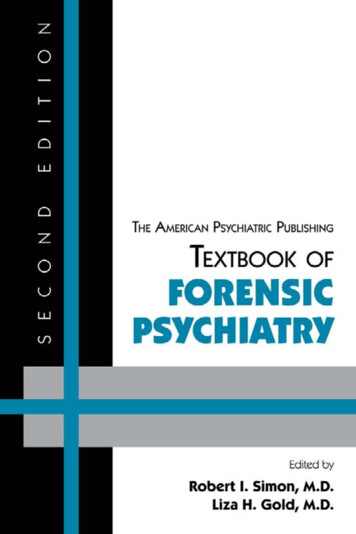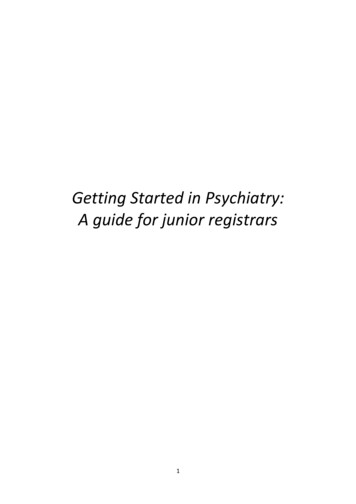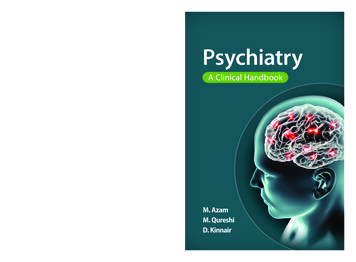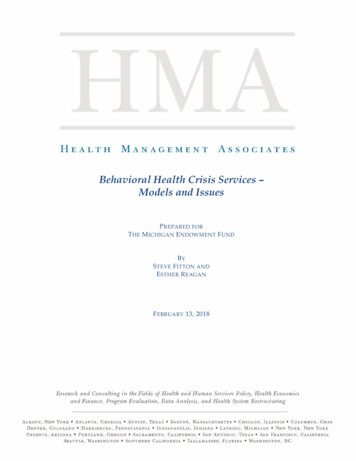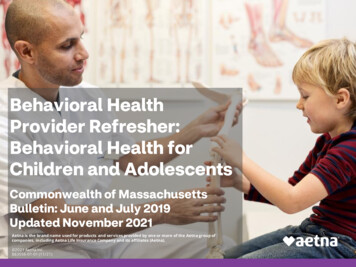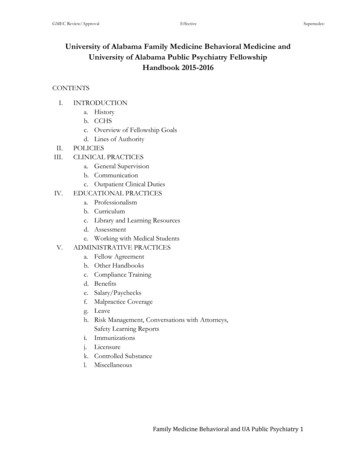
Transcription
GMEC Review/ApprovalEffectiveSupersedes:University of Alabama Family Medicine Behavioral Medicine andUniversity of Alabama Public Psychiatry FellowshipHandbook 2015-2016CONTENTSI.II.III.IV.V.INTRODUCTIONa. Historyb. CCHSc. Overview of Fellowship Goalsd. Lines of AuthorityPOLICIESCLINICAL PRACTICESa. General Supervisionb. Communicationc. Outpatient Clinical DutiesEDUCATIONAL PRACTICESa. Professionalismb. Curriculumc. Library and Learning Resourcesd. Assessmente. Working with Medical StudentsADMINISTRATIVE PRACTICESa. Fellow Agreementb. Other Handbooksc. Compliance Trainingd. Benefitse. Salary/Paychecksf. Malpractice Coverageg. Leaveh. Risk Management, Conversations with Attorneys,Safety Learning Reportsi. Immunizationsj. Licensurek. Controlled Substancel. MiscellaneousFamily Medicine Behavioral and UA Public Psychiatry 1
GMEC s Handbook contains both general and specific information regarding theresidency program, policies and procedures applicable to the Behavioral Medicineand Public Psychiatry programs, and/or policy overviews, which are current as of thelisted effective date. The University and College of Community Health Sciences(CCHS) reserve the right to revise policies and other information deemed necessaryto meet the business needs of the residency program, the University and CCHS,provided such changes do not conflict with ACGME Institutional Requirements, aslast amended. Moreover, this Handbook should not be construed as, and does notconstitute, an offer of employment by the University for any specific duration, nor isit intended to state any terms of employment not otherwise adopted andincorporated as part of any Residency Agreement.Equal OpportunityThe University of Alabama, the College of Community Health Sciences and theBehavioral Medicine Fellowship Program annually reaffirms their commitmentto equal opportunity, acknowledging publicly its obligation to operate in aconstitutional and non-discriminatory fashion, both as an Equal OpportunityEmployer and as an Equal Opportunity Educational Institution. Applicable lawsthat are followed include, but are not limited to, Titles VI and VII of the CivilRights Act of 1964, the Age Discrimination in Employment Act, ExecutiveOrder 11246, Title IX of the Education Amendments of 1972, Sections 503 and504 of the Rehabilitation Act of 1973, the Vietnam Era Veterans AdjustmentAssistance Act, the Age Discrimination Act of 1975, the Americans withDisabilities Act of 1990, the ADA Amendments Act of 2008, and the GeneticInformation Nondiscrimination Act of 2008 and does not discriminate on thebasis of genetic information, race, color, religion, national origin, sex, sexualorientation, age, disability or veteran status in admission or access to, ortreatment of employment in, its programs and services.A. History of the Behavioral Medicine and Public Psychiatry FellowshipsAlabama has a critical manpower shortage in psychiatry, especially in rural areasof the state. The Behavioral Medicine fellowship provides an intensive year oftraining in psychiatry so the primary care physician can be more competent inmanaging a broad array of complex psychiatric cases. The Public Psychiatryfellowship provides one to two years of leadership experience in communitypsychiatry settings, with a focus on rural public health.Family Medicine Behavioral and UA Public Psychiatry 2
GMEC Review/ApprovalEffectiveSupersedes:B. College of Community Health Sciences at The University of Alabama1. Mission StatementWe are dedicated to improving and promoting the health of individualsand communities in Alabama and the region through leadership inmedical education and primary care; the provision of high quality,accessible health care services; and scholarship.We accomplish this mission by: Shaping globally capable, locally relevant, and culturally competentphysicians through learner-centered, community-based medicaleducation and mentoring. Addressing the physician workforce needs of Alabama and the regionwith a focus on comprehensive Family Medicine training. Engaging communities as partners, particularly in rural andundeserved areas, in efforts that improve the health of Alabama’scitizens. Providing high quality, patient-centered, efficient clinical services. Fostering scholarship in relevant and innovative community-orientedresearch to influence population health and support communityproviders.Our core values are: Integrity Social accountability Learning Innovation Patient-centeredness Transparency Interprofessional collaborationFamily Medicine Behavioral and UA Public Psychiatry 3
GMEC Review/ApprovalEffectiveSupersedes:2. Strategic PlanThe College of Community Health Sciences completed its most recentstrategic plan in 2013. The goal was to develop a five-year plan thatbuilds on the College’s deep roots in primary care and family medicineeducation while responding to the changing needs of the communities ofAlabama.There are four overarching Strategic Priorities: Build on the strong foundation of the University of Alabama FamilyMedicine Residency-Tuscaloosa Program Provide an innovative and community-oriented undergraduatemedical education experience Transform the clinical enterprise to deliver exceptional patientcentered clinical care enabled by a culture of continuous learning atall levels Foster an interest in and passion for scholarly pursuit in line with theCollege’s missionFor each Strategic Priority, the plan outlines a number of initiatives thatwill guide the College’s day-to-day tactics to achieving the Priority. TheseInitiatives are presented in three phases. Phase One initiatives are wellunderway. Phase Two initiatives were designed to start once the PhaseOne initiatives were operationally stable, as such, in 2015 we are well intoPhase Two on many of the initiatives. Phase Three initiatives will bestarted as soon as Phase Two initiatives are operationally stable.Strategic Priority A: Build on the strong foundation of theUniversity of Alabama Family Medicine Residency-TuscaloosaProgramGoal: Enhance the quality of the Family Medicine Residency-TuscaloosaProgram through expanded community-based practice and experience,with continued emphasis on rural communities, to prepare primary carephysicians that will be equipped to meet the challenges of a new world ofhealth care.Family Medicine Behavioral and UA Public Psychiatry 4
GMEC e One:A1: Conduct a thorough needs assessment and environmental scan todetermine the current state, educational priorities, and communitybased opportunities for the residency; and then, transform thecurricular structure of the residency to address the growth of theprogram and the evolution of family medicine training standards.A2: Expand the family medicine faculty to meet the needs of agrowing and high-quality residency by recruitment of additional fulltime faculty, with specialty interest in obstetrics, procedures,emergency medicine, and population health, among others, as well asselecting and integrating community-based faculty.Phase Two:A3: Diversify clinical experiences by opening new continuity clinicsites to further serve rural, University, and other populations.A4: Provide more comprehensive training, including in populationhealth management skills, and faculty development for all preceptors.Phase Three:A5: Transform family medicine clinics to be exceptional learning labs,which are regarded as the cornerstone of training; develop andintegrate practice management, team-oriented practice, and clinicalquality throughout residency experience; incorporate technology, e.g.social media and telemedicine.A6: Create a marketing plan to improve residency recruiting.3. Capstone Health Services Foundation (CHSF) and UniversityMedical Center (UMC)The CHSF is a separate 501(c)-3 organization serving as the physician’spractice plan. CHSF is an affiliated foundation of The University ofAlabama and CHSF operates the UMC and UMC-Northport. UMC, locatedon the main campus of The University of Alabama is a large multi-specialtyclinic serving the West Alabama region. Acting as a teaching facility for avariety of allied health fields, UMC primarily serves as a training site formedical students and our family medicine fellows. One of our twoFamily Medicine Behavioral and UA Public Psychiatry 5
GMEC Review/ApprovalEffectiveSupersedes:continuity clinics is located is UMC, while the second is a short five milesaway at UMC-Northport (UMC-NP). UMC-NP is an ACGME approvedcontinuity clinic as well. Both clinics operate under a common set of UMCpolicies and procedures and fall under the oversight of CHSF and CCHSleadership personnel.C. Overview of Fellowship’s GoalsThe residency requires its fellows, before graduation, to obtain the six ACGMEcompetencies at the level expected of a new practitioner. Toward this end, theresidency will define the specific knowledge, skills, and attitudes required andprovide educational experiences as needed in order for fellows to demonstrate:Patient Care that is compassionate, appropriate, and effective for the treatmentof health problems and the promotion of health, both physical and mental.Medical Knowledge about established and evolving biomedical, clinical, andcognate (e.g. epidemiological and social-behavioral) sciences and the applicationof this knowledge to patient care. specifically in psychiatry and its relationshipwith primary care in underserved populations.Practice-Based Learning and Improvement that involves investigation andevaluation of patient care, appraisal and assimilation of scientific evidence, andimprovements in patient care. Fellows are expected to develop skills and habitsto meet the following goals: Identify strengths, deficiencies, and limits in one’s knowledge andexpertise. Set learning and improvement goals. Identify and perform appropriate learning activities. Systematically analyze practice using quality improvement methods, andimplement changes with the goal of practice improvement. Incorporate formative evaluation feedback into daily practice. Locate, appraise, and assimilate evidence from scientific studies related topatients’ health problems. Use information technology to optimize learning. Participate in the education of patients, families, students, fellows, andother health professionals.Interpersonal and Communication Skills that result in effective informationexchange and teaming with patients, their families, and other healthprofessionals. Fellows are expected to:Family Medicine Behavioral and UA Public Psychiatry 6
GMEC Review/Approval EffectiveSupersedes:Communicate effectively with patients, families, and the public, asappropriate, across a broad range of socioeconomic and culturalbackgrounds.Communicate effectively with physicians, other health professionals, andhealth-related agencies.Work effectively as a member or leader of a health care team or otherprofessional group.Act in a consultative role to other physicians and health professionals.Maintain comprehensive, timely, and legible medical records, if applicable.Professionalism, as manifested through a commitment to carrying outprofessional responsibilities and an adherence to ethical principles, with expecteddemonstration of: Compassion, integrity, and respect for others. Responsiveness to patient needs that supersedes self-interest. Respect for patient privacy and autonomy. Accountability to patients, society, and the profession. Sensitivity and responsiveness to a diverse patient population, including, butnot limited to, diversity in gender, age, culture, race, religion, disabilities, andsexual orientation.System-Based Practice, as manifested by actions that demonstrate anawareness of and responsiveness to the larger context and system of health careand the ability to effectively call on system resources to provide care that is ofoptimal value. Fellows are expected to: Work effectively in various health care delivery settings and systems relevantto their clinical specialty. Coordinate patient care within the healthcare system relevant to their clinicalspecialty. Incorporate considerations of cost awareness and risk-benefit analysis inpatient and/or population-based care as appropriate. Advocate for quality patient care and optimal patient care systems. Work in interprofessional teams to enhance patient safety and improvepatient care quality. Participate in identifying system errors and implementing potential systemssolutions.Family Medicine Behavioral and UA Public Psychiatry 7
GMEC Review/ApprovalEffectiveSupersedes:D. Lines of Authority/HierarchyFELLOWSHIP LEADERSHIP: The University of Alabama BehavioralMedicine and Public Psychiatry Fellowship’s director is Marisa Giggie, MD,MPAFF. The Family Medicine Behavioral Health program is also aligned withthe Department of Family Medicine, whose Chair is Ricky Friend, MD. ThePublic Psychiatry program is also aligned with the Department of Psychiatry andBehavioral Medicine whose Chair is Thad Ulzen. The fellowship program is alsoassisted by the Assistant Dean for Medical Education (Harriet Myers, PhD) inmany ways, to include intervention into certain Sponsoring Institution policiesconcerning appeals and due process.SPONSORING INSTITUTION: The Fellowship’s sponsoring institution isThe University of Alabama’s College of Community Health Sciences, whoseDean is Richard Streiffer, MD. Additionally, the Fellowship reports to theAssociate Dean for Academic Affairs (Thad Ulzen, MD), and to the DesignatedInstitutional Official (DIO), David Nichols, who also serves as the ChiefOperating Officer for the College of Community Health Sciences. TheSponsoring Institution (SI) has an official Policy and Procedure manualconsistent with ACMGE requirements. These Policies address all of the CCHSgraduate medical education programs regardless of accreditation or certificationstatus. Each training program adopts the same SI policies, however, theprocedures to accomplish each policy may vary from program to program. It isthe role of the SI’s Graduate Medical Education Committee (GMEC) to reviewand approve each program’s Handbook, which is the set of program-specificrequirements and procedures.ADMINSTRATION STRUCTURE: The Graduate Medical EducationCommittee, referred to as GMEC by the ACGME, is the graduate medicaleducations programs oversight committee. It is chaired by the DesignatedInstitutional Official with voting members including the Residency Director,fellow program director, peer-selected fellows and residents, a PatientSafety/Quality Improvement Officer and a representative from our MajorParticipating Site (DCH Regional Medical Center). This committee deals withinstitutional and accreditation issues that affect all graduate medical educationprograms of the College. All aspects of the fellowship program to includepolicies, clinical, educational, administrative practices along with recruitment, andapproval of funding sources fall under the purview of GMEC.Family Medicine Behavioral and UA Public Psychiatry 8
GMEC Review/ApprovalEffectiveSupersedes:The Alabama State Board of Medical Examiners (ALBME) and the MedicalLicensure Commission of Alabama are the state agencies that regulate theissuance of all licenses to practice medicine or osteopathy in the state ofAlabama. More information about their rules and regulations can be found onthe ALBME website (www.albme.org).ACCREDITATION: While this Program is not accredited by the AccreditingCouncil for Graduate Medical Education (ACGME), the University/CCHSintends to follow Institutional and Common Program requirements for one-yearFellowship programs and will structure its review and accountabilities accordingto ACGME standards.1. Faculty: CCHS has approximately 60 faculty members in the followingdepartments: Community and Rural Medicine Family Medicine Internal Medicine and Hospitalist OBGYN Pediatrics Psychiatry Surgery2. Medical Educators from other institutions involved in the fellowshipinclude these institutions: Tuscaloosa Veterans Administration Hospital,Maude Whatley Health Services, Horseshoe Farms, and Indian Rivers MentalHealth Center.II. POLICIESAs previously stated, The Sponsoring Institution (SI) has an official Policy andProcedure manual consistent with ACMGE requirements. This program has adoptedthe SI policies, however, the procedures to accomplish these policies are tailored to fitthe fellowship program. In addition, there are some specific residency policies,procedures and practices which are applicable to the residency program. It is the role ofthe SI’s Graduate Medical Education Committee (GMEC) to review and approve eachprogram’s Handbook, which is the set of program-specific requirements and procedures.The SI Policy Manual is maintained online and accessible via the CCHS Intranet Site. Atany time you may request a copy of a policy from the Residency Office, however, it isthe fellow’s responsibility to ensure the paper copy is the same updated policy that isonline. The online version is considered the official policy.Family Medicine Behavioral and UA Public Psychiatry 9
GMEC Review/ApprovalEffectiveSupersedes:The SI Manual contains the following policies:1. Eligibility, Recruitment, and Appointment2. Promotion, Appointment Renewal and Dismissal3. Due Process4. Grievances5. Leave6. Impairment7. Harassment8. Accommodation for Disabilities9. Supervision10. Duty Hours11. Moonlighting12. Vendors13. Non-competition14. Disasters15. Closures and Reductions16. Drug and Alcohol17. Probation-Remediation-Suspension18. Professional Appearance PolicyThe Fellowship Handbook is further sub-divided into the following sections: Clinicaland Educational Practices as well as Administrative issues you need to be familiarwith.III. CLINICAL PRACTICESA. General Supervision- (see Sponsoring Institution Policy and General Attending PhysicianResponsibilities Policy)The fellow must not independently perform procedures or treatments, or managementplans that he/she is unauthorized to perform or lacks the skill and training to perform.The fellow is responsible for communicating to the attending physician anysignificant issues regarding patient care.B. Communications1. Cell phone and Email:Professional behavior and responsibility is expected of all fellows. Theprogram director, clinic personnel, the answering service and your rotationteam members need to be able to reach you at any time, unless you are onFamily Medicine Behavioral and UA Public Psychiatry 10
GMEC Review/ApprovalEffectiveSupersedes:approved leave. Our primary means of contact will be through your cellphone and/or email.2. Faculty-Fellow Communications/Feedback: Feedback is providedduring rotations along with an evaluation completed at the end of the quarterby the attending physician.A. Outpatient Clinical Duties1. Overview:The fellow’s patient panel in his/her continuity clinic is assigned for theduration of the fellowship. A fellow may add family members of his/hercurrently assigned patients to his/her panel at any time by notifying thefellowship office. See the General Attending Physician ResponsibilitiesPolicy for more details.2. University Medical Center and UMC-Northport: as applicablea. Release of Protected Health Information (PHI)i.General Expectations and the Electronic Medical Record:There is a 24-hour availability of University Medical Centerrecords by computer. Fellows are expected to comply with allUMC policies and procedures regarding the Electronic MedicalRecords System.ii.Faxing/Receiving Confidential Patient Medical Records:Facsimile transmission of health information should occur onlywhen the original record or mail-delivered copies will not meetthe needs of immediate patient care. Health records should betransmitted via facsimile only when: (1) needed for patient care;or (2) required by a third party payer for ongoing certification ofpayment for a hospitalized patient. The information transmittedshould be limited to that necessary to meet the requestor’sneeds. The Medical Records Department should make routinedisclosure of information to insurance companies, attorneys, orother legitimate users through regular mail or fax. Except asrequired or permitted by law, a properly completed and signedFamily Medicine Behavioral and UA Public Psychiatry 11
GMEC Review/ApprovalEffectiveSupersedes:authorization should be obtained prior to the release of patientinformation. An authorization transmitted via facsimile isacceptable. Consult the Medical Records Department to assistwith all release of information requests. Any release ofinformation should be charted in the patient’s medical record onPHI.Each fax machine should have someone monitoring incomingdocuments. This individual should remove incoming documentsimmediately, examine them to assure receipt of all pages in alegible format, and send them in accordance with theirinstructions. Faxed documents will be scanned into the EMR bythe staff of the Medical Records department. All actions will be inaccordance with HIPAA regulations: Faxes should be sent/received using fax machines in a secure,limited area. Fax requests from unfamiliar sources should always beverified. Highly sensitive health information will not be faxed. Psychotherapy notes will never be faxed. iii.A printed confirmation record is used to confirm that the faxwas delivered to the correct number.Incomplete ChartsWithin the fellowship program, incomplete is defined as anyclinic visit note or procedure note not completed within 72 hours of the encounter.Timely completion of patient records is good patient care.Additionally, fellow chart documentation is necessary before theattending can complete their documentation. Attendings arerequired to complete chart documentation within 30 days of theencounter otherwise, they are subject to a financial penalty. Seealso UMC Policy.d. Chargesi.Patient Charges and Discounts:Family Medicine Behavioral and UA Public Psychiatry 12
GMEC Review/ApprovalEffectiveSupersedes:At UMC, professional physician charges are competitive withthose of local physicians. Fellow should document the visit. Theattending will submit the charges for billing. Fellows shall beresponsible for coordinating any questions or concerns oncharges to patients. Specific policies are outlined below.ii.Identification of all Services at University Medical Center:Each patient who receives medical care at UMC should be billedin the computer. Fellows are encouraged to document at the timeof the visit. In the event a special circumstance warrants amodification of this policy, the Chief Operating Officer (COO),the Chief Financial Officer (CFO), and the Director of Billingand Compliance should be consulted.iii.Fee Adjustments:Fellows may offer professional courtesy adjustments only afterconsultation with the Director, Billing and Coding Compliancein the Business Officeiv.ComCare (charity) Policy: (See UMC Policy on Chart Completion)Indigent patients should be referred to the Social Worker at 3487195.e. Other Clinical Proceduresi.Medical Transportation:Patients who require transfer to DCH for emergency care oradmission will be presented to an attending, and will not betransported to or from DCH without authorization from theattending. Notify the nurse staff in the clinic to call for transport.ii.Transfer of Patients:All patients who request a change in their assigned physicianshould be referred to an attending in that suite, who will arrangethe transfer. Changes should be made according to a random listof physicians in each suite. The old physician and new physicianFamily Medicine Behavioral and UA Public Psychiatry 13
GMEC Review/ApprovalEffectiveSupersedes:should be informed of the change and the circumstancessurrounding it.iii.Dismissal of Patients:UMC has a specific policy on the dismissal of a patient and allsuch dismissals must follow this policy. A fellow physician mayrequest that a physician-patient relationship be ended. Fellowsmust get approval from an attending to terminate a patient. Theattending must review the patient’s chart carefully, ensuringcompliance with the dismissal policy and that there are noomissions in the standard of care and that no indiscreet remarkshave been made in the chart. The attending will then ask theclinic director and department chair to end the relationship. If thepatient is being seen by a physician in another department, theattending must get termination approval from the otherphysician. The clinical director will request a form letter to besigned by the fellow and attending. A copy of the signed letterwill be placed in the patient’s chart. Terminations do not affectthe patient’s immediate family members, except in the case ofoutstanding bills.If administration initiates a request for patient termination due toan outstanding bill, an attending will be asked to review thepatient’s chart, as above. The clinical director will then request aform letter to be signed by the fellow and attending.A patient has 30 days from the date on the termination letter tofind a new physician. If urgent medical care or prescription refillsare needed during this time frame, the fellow on referred callmust see the patient, if the patient so desires.iv.Referrals:When a patient is referred to another physician in or out ofUMC, the fellow must complete a Referral Request Form and faxit to the consultant. The “Plan” section of the chart note shouldreflect why the patient is being referred. It is customary to referprimarily to physicians who are involved in the teaching offellows.In addition to the Sponsoring Institution Policy on Moonlighting:Family Medicine Behavioral and UA Public Psychiatry 14
GMEC Review/ApprovalEffectiveSupersedes: Fellows are advised that the Alabama State Board of Medical Licensure andthe DEA have the authority to independently investigate and prosecuteindividual fellow physicians with regard to compliance with the following:That moonlighting fellows are fully licensed and have their own malpracticeand DEA number. NOTE: International medical graduates are not allowedto obtain a full license in the state of Alabama until they have completedresidency.Things to remember when moonlighting: Pre-signing prescriptions. Using University Medical Center (UMC) prescriptions outside UMC. This isprohibited – your UMC number is site specific. Controlled substance prescriptions must be properly completed, with thepatient’s name and address plus the date. Following accepted practice guidelines of the site of moonlighting. All moonlighting fellows should be cognizant of Medicare fraud and abuseguidelines, be aware of state ethics requirements, and remain clear about theirindividual accountability for contracts, attestations, or statements that theysign in their roles as independent moonlighting physicians.IV. EDUCATIONAL PRACTICESA. ProfessionalismProfessionalism is one of the core competencies that the Accreditation Council ofGraduate Medical Education (ACGME) has identified as being vital to the clinicalpractice of medicine and to fellow development. The Professionalism Policy mustbe signed and turned into the behavioral medicine office.“Windfall” and Professionalism:Occasionally you will be on a rotation where your preceptor takes a day off orreleases you to go home early. Your preceptor being off does not free you fromresponsibility to your patients. You are expected to be reachable by pager during theworkday, unless you notify the residency office that you will be taking leave.B. Curriculum1. Overview of the CurriculumFamily Medicine Behavioral and UA Public Psychiatry 15
GMEC Review/ApprovalEffectiveSupersedes:The curriculum for the Behavioral Medicine Fellowship consists of didacticmodules, psychotherapy supervision, and research. Textbooks include:Psychiatry & Primary Care, 20 Common Behavioral Problems in BehavioralHealth, Essentials of Clinical Psychopharmacology 2nd Edition, Rating Scales inMental Health, 2nd Edition, The Ten-Minute Guide to Psychiatric Diagnosis andTreatment, Integrated Care: Working at the Interface of Primary Care andBehavioral Health, Destroying Sanctuary, The Crisis in Human Service DeliverySystems, Lippincott’s Primary Care Psychiatry, The Fifteen Minute Hour:Applied Psychotherapy for Primary Care, Clinical Manual of SupportivePsychotherapy, and Cognitive-Behavior Therapy.Didactic ModulesSession 1: PrinciplesSession 2: Suicide and Violence Risk AssessmentSession 3: Basic Psychopharmacology, Metabolic Syndrome, and the Use ofAntipsychoticsSession 4: Psychotherapy in Primary Care: CBT & Brief PsychotherapySession 5: Mood Disorders: Depression & Bipolar DisorderSession 6: Anxiety DisordersSession 7: Substance & Alcohol Use DisordersSession 8: Geriatric Psychiatry & End-of-Life Care and Palliative MedicineSession 9: DeliriumSession 10: DementiaSession 11: Human Development Throughout the Life CycleSession 12: Psychological TestingSession 13: Mental Retardation & Learning DisordersSession 14: Autistic Spectrum DisordersSession 15: ADHD & Disruptive Disorders in Pediatric PatientsSession 16: Depression, Bipolar Disorder & Anxiety Disorders in Children &AdolescentsSession 17: Eating & Growth Disorders in Pediatric PatientsSession 18: Psychotic Disorders: An Approach to the Patient with Schizophreniaand Other Psychotic DisordersSession 19: Personality DisordersSession 20: Somatization Disorders & Chronic PainSession 21: Psychological Factors Affecting Medical Illness2. Conferences and Scholarly Activities:a. Academic Afternoon and other Academic Conferences:Family Medicine Behavioral and UA Public Psychiatry 16
GMEC Review/ApprovalEffectiveSupersedes:Once a quarter, a special-called meeting of all fellows and residentscurrently in graduate medical education training programs within theCollege will be held during Tuesday Academic Afternoon. This “Forum”is consis
Family Medicine Behavioral and UA Public Psychiatry 2 INTRODUCTION This Handbook contains both general and specific information regarding the residency program, policies and procedures applicable to the Behavioral Medicine and Public Psychiatry programs, and/or policy overviews, which are current as of the listed effective date.
